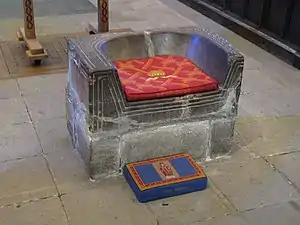Frithstool
Among ancient English writers, a frithstool, frith stool or fridstool signified a seat, chair, or place of peace, in reference to the Anglo-Saxon concept of frith.

The most famous surviving examples are in Beverley Minster and Hexham Abbey. That in Beverley has the inscription Haec sedes lapidea Freedstoll dicitur, i.e. Pacis Cathedra, ad quam reus fugiendo perveniens, omnimodam habet securitatem.
Also, fridstoll or frithstow, Old English frithstól, frythstól, freedstool, fridstool, meaning (a). Old English only, A place of safety; a refuge; (b). A seat, usually of stone, formerly placed near the altar in some churches, which afforded inviolable protection to those who sought privilege of sanctuary.[1]
The term also signified a palace, which was usually a privileged place.
References
- OED Online (December 2016). "† frith-stool, n." Oxford University Press. Retrieved 7 March 2017.
 This article incorporates text from a publication now in the public domain: Chambers, Ephraim, ed. (1728). Cyclopædia, or an Universal Dictionary of Arts and Sciences (1st ed.). James and John Knapton, et al.
This article incorporates text from a publication now in the public domain: Chambers, Ephraim, ed. (1728). Cyclopædia, or an Universal Dictionary of Arts and Sciences (1st ed.). James and John Knapton, et al. {{cite encyclopedia}}: Missing or empty|title=(help)